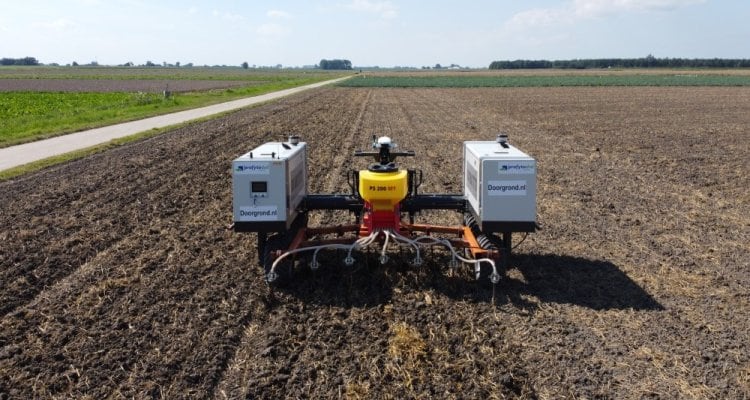The project – called Robs4Crops and funded with a €7.9 million budget from the European Union – promises to bring a high-tech revolution to farms and offer a tremendous potential impact on productivity, efficiency, and environmental sustainability.
“This project is not about producing more fruit and vegetables,” the project’s coordinator Dr Frits van Evert, Senior Scientist at Wageningen University & Research, told FoodNavigator. “The focus of this project is on replacing hard to get labour.”
Farmers are being hit by falling commodity prices, labour shortages, and difficulties related to planting and harvesting crops – particularly during the pandemic, which has left fields of fruit and vegetables unharvested because thousands of seasonal workers were unable to travel to work due to the virus, he said.
Robotics and automated solutions therefore offer the greatest opportunity for savings, safety, and increased productivity. Robotics and related technologies bring precision and repeatability to mundane tasks, reducing the need for farmers to engage in work that is “unpleasant, unhealthy and requires zero thinking”, he told us.
‘Agricultural robots are not yet reaching their potential’
As a result of the coronavirus, there is now heavy investment in robotics and automation in agriculture, but according to the scientists behind the Robs4Crops project, agricultural robots are not yet reaching their potential because they are used as stand-alone units rather than as part of a complete, innovative robotic system.
Via trials in four countries - the Netherlands, France, Spain and Greece -- the project hopes to create a robotic farming solution consisting of three elements: smart implements, autonomous vehicles, and the farming controller. Existing agricultural machinery and tractors will be upgraded so that, together with existing agricultural robots, they can function as parts of a robotic system. Development and testing will take place in practice, under real operating conditions, in the four countries.
Hopes to reduce the carbon footprint of food production
The project focuses on the most demanding and repetitive field operations, specifically mechanical weed control and spraying against pests and diseases. The new flexible and modular systems will greatly reduce the dependency on hired labour, increase safety, and be more environmentally friendly, said van Evert.
There are several ways that robotics can help reduce the overall carbon footprint of food production. Tractors use diesel, for example, a major source of carbon emissions in farming. One of the best ways of reducing the carbon footprint of food production is by replacing ploughing, which releases carbon into the atmosphere and depletes the micro-organisms which enrich the soil, with a reduced form of tillage.
However, reduced ploughing means growers have less control of weeds. Robots offer a solution by using artificial intelligence to identify individual weeds. “The hope is that robots will be able to travel slowly via a precise weed elimination mechanism and will be able to work in a reduced tillage situation,” explained van Evert.
This further allows growers to use less pesticides and fertilizers. Machines can sow seeds and apply exactly the right amounts of pesticide and fertiliser in the right places, rather than spraying it across a whole field.
Driving robotics into the mainstream
In an attempt to make robotic farming mainstream, the Robs4Crops project aims to provide a safe testing ground for iterative development and innovation through a network of collaborating partners.
“Agriculture is very sensitive to the cost and scarcity of labour. And making cultivation practices more efficient and sustainable is critical,” said van Evert. “Robs4Crops is a game-changer in revitalising the European food and farm industry and the vital catalyst in accelerating the adoption of high-tech robotics and automated technologies in agriculture.”





